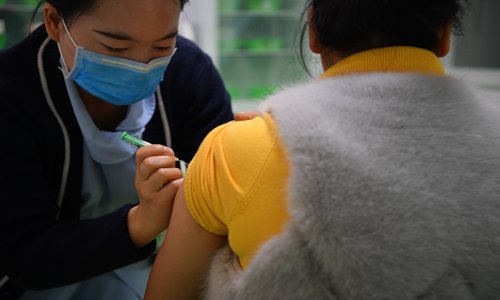
A woman has an HPV injection at a hospital in Kunming, Southwest China’s Yunnan Province in November 2017. File Photo: VCG
China's first domestically produced vaccine against the cancerogenic human papillomavirus (HPV) will be available by appointment from May, making China the third country in the world to achieve an independent HPV vaccine supply after the US and the UK.
The two-valent vaccine, jointly developed by Xiamen University and a Xiamen-based biotech company Innovax, marks progress by China in HPV vaccine production, considering the complexity in production techniques in genetic engineering vaccine and multiple-valent vaccine, an expert said.
The new vaccine is designed for use by females aged 9 to 45 and protects them against HPV 16 and 18 types, the two most common viruses that lead to cervical cancer.
Vaccination for women aged from 15 to 45 requires three doses, for those aged from 9 to 14 years old it only requires 2 doses, according to a press release published on the company's website.
Prior to the new vaccine, HPV vaccines available in China were all imported ones, produced by a British pharmaceutical company, which makes a two-valent HPV vaccine and a US drugmaker that produces a four-valent vaccine and a nine-valent HPV vaccine, according to a December notice published on the official website of the National Medical Products Administration.
The vaccines, especially the 9-valent one, have been in short supply in China, compared to the high demand. Statistics show that a total of 1.46 million doses of HPV vaccines were issued in China in 2017; 7 million issued in 2018; and 8.7 million issued from January to November in 2019. But there are currently 356 million people aged from 9 to 45 in China who are potential candidates for HPV vaccination, according to media reports.
A staff member at a health service center in Jing'an district of Shanghai told the Global Times on Tuesday that people now need to wait about two to three months to get four-valent and nine-valent vaccines at their center.
"I registered for vaccination with the four-valent HPV vaccine at the health service center of my community in October last year and have not been vaccinated yet," Zhang Yanli, a Shanghai resident, confirmed with the Global Times.
The new vaccine is much cheaper with each dose priced at 329 yuan ($46.5), compared to imported ones.
The staff member at the Jing'an service center said that vaccination with the all three types of imported vaccines take three doses. The two-valent and four-valent vaccines at the center cost 585.5 yuan and 808.5 yuan per dose respectively, while the nine-valent one could reach over 1,300 yuan per dose.
The price is even higher at private clinics. At a Shanghai-based private clinic that Global Times reached out to, three doses of imported two-valent HPV vaccines cost 2,788 yuan, the four-valent costs 3,888 yuan and the nine-valent costs 5,980 yuan.
"I am going to get vaccinated (with the domestically made vaccine), it is much cheaper," one Sina Weibo user commented, while some others are still looking forward to four- or nine-valent ones to be developed in China.
Wang Jun (pseudonym), a Beijing based medical expert in immunology, sees the new vaccine as a sign of China's huge market in HPV vaccine and expects to see China-made HPV vaccines that cover more virus types. "Chinese women have high regard for HPV vaccines as people are more likely to be protected through one immunization," Wang added.
A nine-valent vaccine by the company has reportedly entered into a clinical trial.
"The earlier you get the vaccination, the better," he noted, suggesting women be vaccinated as long as they are at the earliest possible age for vaccination, normally 9 years old.
The expert noted that it takes about two to three decades for cervical cancer to develop in women from HPV infection. "Therefore, regular screening is still required," he said.
HPV is the most common sexually transmitted infection. The expert also suggested people should wear condoms during sex to block infection, considering the HPV family includes 132 serotype viruses.
Cervical cancer is the fourth most frequent cancer among women, which claims the lives of 30,000 women around the world every year, according to a WHO report released in February 2019.
